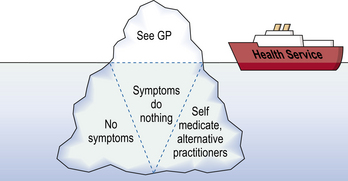Chapter 44 Deciding to consult
Understanding why people with symptoms do or do not consult a doctor is important because some doctors feel frustrated and angry about ‘inappropriate or trivial’ consultations, and some patients feel frustrated and angry about doctors whom they perceive as uninterested in their problems. Both sets of feelings influence subsequent consulting behaviour, medical treatment, adherence and health. Delay may seriously affect a patient’s risk of disease progression and the development of complications.
The symptom iceberg
Estimates of the proportion of people who experience symptoms of ill health vary from survey to survey, though the 2003 Scottish and English health surveys generally reveal similar prevalence rates. Box 1 summarizes some of the results of the Scottish Health Survey.
Figure 1 is easier to remember and, although the proportions are not strictly accurate, the general picture is valid. Over a 2-week period, about 75% of the population will experience one or more symptoms of ill health. About one-third of these people will do nothing about their symptoms. About one-third will self-medicate or seek the advice of an alternative practitioner (see pp. 146–147), and about one-third will consult their GP. How high/low the iceberg sits in the water will reflect access to doctors and other health care professionals (including complementary and alternative medicine) and patients’ confidence in their self-care abilities. In some areas, patients are now being offered alternative ways of accessing doctors using telephone or e-mail consultations. NHS Direct (NHS-24 in Scotland) provides a 24-hour information service (by phone and on the web) and a nurse-led advice service uses nurses to triage the nature and urgency of the caller’s problem, and directs the caller to the most appropriate health care professional.










